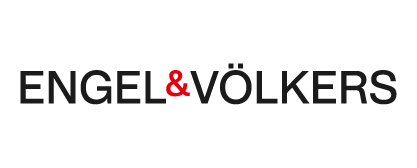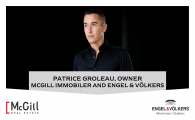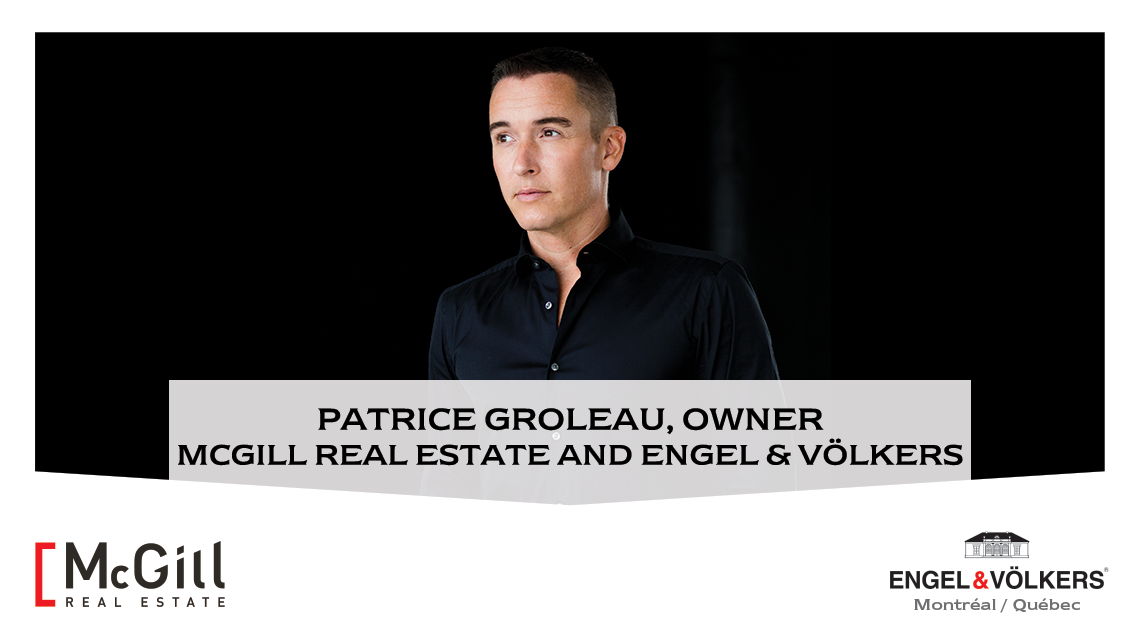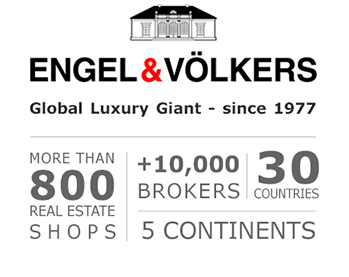Broker’s desk interview with Patrice Groleau
Transcript
SS: Welcome to this special edition of the Broker’s Desk with my good friend Patrice Groleau.
PG : How are you?
SS : Great, thanks for being here.
PG : Thank you.
SS : For those of you who don’t know Patrice. He’s the owner of Engel & Volkers and McGill Immobilier with your partner, your wife Debby Doktorczyk.
PG: Exactly.
SS : Patrice, first of all: congratulations. You’ve done something fantastic, phenomenal. You’ve positioned yourself as the #1 agency in Quebec with McGill for resale. I think you’re carving out yourself a place in Luxury Real Estate with Engel & Völkers.
PG: Thank you.
SS: Tell me a little bit about your background.
PG: With McGill, we celebrated our 15th anniversary last December. It was a bit of a bump in the road, but that’s the way it is, companies that start with life accidents. My wife Debby was already doing this with “small developers” (I say this with big quotation marks out of respect for our mega developers) but Debby has a background in interior design, she went to the Beaux-Arts in Brussels as an interior designer and all that, so with a partner here in Montreal she was buying duplexes, converting them into cottages, converting duplexes into condos, things like that. When we met, we weren’t really satisfied with the real estate brokers we were working with, or at least we considered that we were able to do the same or even better than the real estate brokers we were working with. Debby did her [broker] licence, and at the time I came from the financial world, I wanted to leave that field. I started working in different jobs and that led me to work in a company owned by Philippe Boisclair, who was one of the co-owners who had just started a company called McGill Development, a small developer who was starting a first project in the beginning of McGill Development. While working with Philippe, Philippe told me that he was looking for a salesperson to sell his first major project. So, my wife, she got her licence and that’s how it started, and the work I was doing with Philippe was more or less to my liking. So, I decided to join Debby, I wanted to get my license too, we were planning to have children, so I wanted to get the license to be able to help her when she was pregnant and things like that, so we started selling real estate projects together, reselling together and it all came together and the business plan changed every three months. But there was a big trigger, which is a nice anecdote: We never intended to bring such a big volume, we wanted to do a small business together as a duo, maybe with one or two people to be able to help each other out during the holidays, things like that. And then one day an agency, a major agency opened, announced that it was going to open an office across the street from our offices. We were on McGill Street in Old Montreal, and they took a name very similar to the name we were using. So, knowing that they were going to open, I called them and asked them: “Listen, you have all the dictionary you can think of to pick your name and you are taking a name that is very similar to ours, and you are across the street and you are going to specialize in the sale and marketing of real estate projects”. And the person said, “You know who we are, we’re worth millions, so before you lose too much money, come work with us right away. I was a little surprised, Debby saw my reaction on the phone, I said: “Listen, is that your final answer? “I’m going to give you one last chance. ”Yeah, we are certain that you will not survive against us”. I looked at Debby and I said, I literally said, “GAME ON” and hung up. I said, “Debby, let’s shut them down.
SS: WOW
PG: And that was the challenge. So, it started off as a challenge. We play fair, we play by the book, but the worst thing you can do is give me motivation, and at that moment was on a mission. At first, we just wanted to do this for us. But then I had a mission to be stronger, to supplant this person who had said this strange sentence… That’s it, that was my motivation, and it started.
SS: So actually, competition is very good. We talk a lot about competing with ourselves, being Zen, and then the whole kit… But sometimes a good competition…
PG: If you don’t have competition, you don’t have a market. In every industry there’s always a Coke and always a Pepsi. In every industry. So, we had just found our player, our challenge.
SS: So, you can thank them a little bit…
PG: Honestly, today, yes.
SS: Do they still exist?
PG: No, no, over the years we’ve managed to do… in the right way and just doing it by performance, by being “better than”…
SS : Because you don’t have to play dirty to beat your competitors.
PG : Absolutely not.
SS : But you play hard.
PG : Exactly. I really play fair. For me, it’s like a big giant complex board game, like a “Ni-Shi-Ki” with 1000 squares and you’re playing hundreds of game quarters ahead of time.
SS : Okay, let me ask you a question: how do you stay focused, play hard, play fair, if your competitor is doing moves like that? If they will take your name, or if they don’t play fairly?
PG : That happens a lot. Unfortunately, in all industries, it’s not always that everybody’s going to play by the rules, but we must not be influenced, not to fall into that trap, not to fall into that pattern…
SS: Reactionary…
PG : …keep doing what you’re doing, and let that noise pass. For me, these people who make this kind of move, they’re not focused on the main objective anymore, they’re more reactive to what we’re doing. In the meantime, we continue going forward.
SS: You keep moving forward.
PG: For the first five years we didn’t take any days off. It was five years non-stop.
SS: No days off
PG: We look at this in retrospect. It’s even that with the years I have forgotten, it’s like the brain forgets the harder times. It was…There wasn’t really a shortcut, we were “all in”, it was refinancing, parents helping out, borrowing and all that, that’s it…It wasn’t a long quiet river. There’s a bit of luck in everything, you make your own luck, but there’s also a bit of luck in the dozens, forty or so agencies. It was a bit of a trend, independent agencies popping up and all that, and there were three, maybe three left out of the forty. The others all closed or were acquired at very low cost, so it’s as if they had closed… Even at that time we, when we were making a decision, we had the option…We knew people in Toronto, our competitor in the high-end, they had offered us with the first two brokers for eastern Canada for a luxury banner that was coming in at that time. We declined, and it’s funny to be in the full circle, fifteen years later, now a competitor of one of the first options we declined.
SS: Sometimes as they say, “the best deal you make is the one you don’t”.
PG: But in this case, the competing agency had cleared the way, it was very positive for us, they still brought into the industry the concept of an agency that specialized in a niche, to bring that concept to the client, to do business with a specialized agency.
SS: They kind of paved the way.
PG: Completely. At the same time, the beauty is always to get there second, because then you see the mistakes made, you try not to repeat them. And then you come in with a version that’s often improved, based on what has been done by different players in the past. There after ten years, there was another “trigger”. There were major investment funds that wanted to buy McGill Immobilier, which owns several other brands of Canadian or North American real estate agencies, and we listened to them, we met them. The presidents of those funds came down. So we saw and we were told at the same time: “we have an interest”, which means that Debby and I were doing something good, but at the same time, my wife is of Belgian origin, so when we went to the in-laws we saw Engel & Völkers, which is a monster, in Europe it’s THE monster, it’s dominant, dominant in the upper end of the market.
SS : You’re making it a monster here too.
PG: So it’s going well. I’m a big fan of real estate marketing. With Marc, our VP, with all this. I look at everything that’s done in the world of project real estate marketing, resale, and for me, when I saw Engel & Völkers in Europe, I said to myself that this brand is the most beautiful luxury real estate brand that exists. This brand is perfect, Christian Völkers, I call him the “Steve Jobs” of real estate, this guy has an impeccable marketing vision, and so that’s it, there were still 18 groups interested in acquiring the rights for Quebec.
SS: At the time you bought it?
PG: Honestly, with our financial capacity and all that, compared to some players who were worth tens of hundreds of millions of dollars, we thought that in the financial game, it won’t pass, we won’t win that game. McGill was starting to do well, but we had still made major investments for ten years, except that we were lucky. The Canadian president was Richard Brinkley, who was the former owner of Sutton Ontario for a while. He was returning to Canada, a real estate enthusiast who did not necessarily need to work but who wanted to get back into the real estate game, and we were lucky that he chose us. When we asked him, “Why did you pick us?”… He said, “What you did with McGill Immobilier, saying it’s an anonymous brand, taking it to a specialization that’s so competitive and difficult, I’ve never seen anything like it. So, with a brand as powerful from a marketing point of view as Engel & Völkers, it can only work, and secondly, I see the most fun with you, and I want to have fun. I really liked that comment, it was a leap of faith at the same time because I remember the players who were better structured financially at the time, but in the end, all this to say that last year, after three and a half years, we finished first in volume and number of transactions for the Americas at Engel & Völkers. So, his gamble was good, our gamble was good.
SS : Actually this is the second time you have overcome obstacles or are the odds against you with the company that opened in front of you?
PG: Yes.
SS: …then now against competitors who may have had more money but that never stopped you.
PG: And strangely enough, it also energized McGill Immobilier, we were talking about it with Marc. The synergy between the two had been somewhat underestimated. We’re the only franchisee in the world to own another real estate agency, because we made it clear to them that McGill is not a traditional agency. It’s really more of a consulting business, it’s not really a competition from a resale point of view, but that kind of chemistry is extraordinary: one finishes the other. And at the time, we had, on certain occasions, lost top-of-the-line projects to competitors who had this international network or who were pleading for this international network. So today, this whole niche of higher-end projects is also coming to us with expertise.
SS: You have added it to your inventory…
PG: Today we have 175 programmers, designers, support teams, brokers… We’re a great team. We’re a great team. We’ve also kept, even despite the 175, a great energy, family collaboration, very cliché.
SS: We had already discussed the fact that you were offering, I think, a program I think for your brokers in the health sector, can we talk about that?
PG: Yes, we pay a monthly fee so that the brokers can consult nurses and doctors very quickly. So that’s it, we have calculated that in 2019, we will exceed an average of $33,000 in expenses per broker per year. I know enough people in the industry, I don’t think it exists anywhere else, so that’s it… it’s very transparent and often people will say: a director or a company executive, by the middle of January he made an average salary, I guarantee you that my T4, I reach the average in December like everyone else. We have calculated, using independent figures, that we are at the highest average commission per broker for any banner. So, it’s very transparent, it’s very honest, but there’s a major reason behind it. I am not judging real estate investment funds, but investment funds in general often have a short-term vision of profit maximization. Engel & Völkers is the only non-American banner that is 100% privately owned. There is really a much longer-term vision, so it keeps a little bit of the human side, which unfortunately in many industries is lost with money, so it’s a financial calculation.
SS: Actually, if I understood correctly, Engel & Völkers does not sell a franchise in Quebec, so it’s a family. That’s what the world is looking for in these interviews, is to find something that motivates them. It’s the fact that you’ve been all-in and overcome. That’s the next point I want to touch, it’s okay to go all in when you have nothing to lose or little to lose. But then, when you decided to do Engel & Völkers, you had something on the line, you had something to lose.
PG: I already had something going…
SS: You were still in development. You’re okay to talk about that.
PG: Yes. Yes.
SS: It makes the conversation much more authentic. One of the things we were talking about earlier was how you were all-in when you decided to go with McGill against a competitor with maybe not all the experience or the resources. It’s okay to go all-in when you have less to lose, but when you decided to go for Engel & Völkers, you had something to lose. How do you go all-in a second time?
PG: That’s the challenge. It seems like…McGill was doing well, we could keep growing McGill, but it’s really the challenge to launch something else. My wife may also have that kind of personality, to like to try things. At the same time, we have three children, and in addition to the fact that there was the equation of three children, the children double 11 and 9 of age, so when we started McGill 15 years ago there were no children in the early years. But in addition to the three children, you refinance the house, you have to be imaginative, and then, we had to open a whole bunch of offices. As a reality of our carrying costs, annual fixed costs before making a single dollar, that too us elsewhere. These are really other figures. With a 6,500 square foot flagship in Port Royal on Sherbrooke, we bought an old pharmacy in Old Quebec and Centropolis, we’re under construction at Solar, so the locations are very expensive in terms of costs, but they are a requirement for the franchisor, so we can become nervous quickly.
SS : How do you stay calm in all this?
PG: Strangely enough, I was a very stressed person fifteen years ago. I’m getting calmer and calmer though… it’s getting bigger. The bigger it gets, the calmer I am.
SS: Do you have confidence in your own abilities, the fact that you’ve done this before?
PG: Maybe you think after fifteen years it’s working year after year. At McGill we have a constant progression. Always selling more, closing rates are maintained year after year. We’ve sold over 10,000 condos, 4 billion and this year we’ve already had 3,000 condos announced just for the first six months out of a 15-year history of 10,000. So, the progress is still dazzling. We are winning with E&V, the figures came out of IMS independent and we still finished first in the so-called high-end agencies, the luxury agencies. The results are there. You take comfort in that and that’s it. The team too, we have strong players. It’s really a big family, I think it’s really a family. When I talk about clichés, Coryne, she was 15 years old when we met, and now she’s our chartered accountant. Her mom works with us, her husband, my best friend, my sister-in-law, so I think it’s unique. We didn’t get lost in there, we still have that closeness to everybody, we know the kids, we know families. We know when you feel under the weather, when someone is sick, the deaths, the births… There is a human side, and I think that when you treat your world well, your world gives it back to you. It’s that kind of circle.
SS: The fact that Engel & Völkers sold you the franchise, there are no other franchisees in Quebec?
PG: In Quebec, we had to open offices. We have Tremblant, which is a good example. Tremblant was Intrawest, the brokerage division of Intrawest. What we did was that Intrawest, which was acquired by Fund X, that fund was acquired by Fund Y, which is basically a fund specializing in ski mountain operations. We had estimated that if we came to compete with Intrawest Mountain Operators and all the land for the projects, we might be 12 to 14 years before a break-even, so strategically it didn’t make sense. So, EV World made an agreement with this fund to open Engel&Völkers in all the ski mountains: Whistler, Blue Mountain…and then in two years, at Tremblant, the competition was completely demolished, this 70% market share really exploded. So, there are sectors like that, where offices that are strategic like Tremblant, or other offices where offices will never be profitable… even our competitor has been there for 15, 16 years with three-four brokers. At some point, a photocopier, a coffee machine, a receptionist at the office… there’s absolutely nothing left. So, the utopia of saying “we open everywhere”, it has to be viable.
SS: The most important points compared to the ski mountains, which are still your Engel & Völkers family…
PG: We have 95% of the territory population ratio.
SS: The reason why I’m on this is that somewhere there won’t be this self-cannibalism or this internal competition of several agents of the same brand? Is it always you?
PG: No, already the South Shore, the North Shore, Montreal, Quebec City, and all that… it’s definitely us. So, recruitment, the profile type of the broker, the management of the branding…
SS: What you offer for your brokers, visions, values…
PG: Exactly. That’s a very good point, because in some banners, you see that they open two banners of two different franchises, even sometimes on the same street, one is hiring away brokers from the other, so I don’t think it creates an energy, a synergy… We have a vision, we have applied it.
There’s a reality too. Marketing brands often have North American campaigns, sometimes Canadian ones, but Quebec is a reality in itself. So, we really didn’t want to be dependent on strict international or North American marketing, which we couldn’t adapt to our reality. Engel & Völkers understood that, I must say that we use a lot of their graphic elements.
SS: The European cachet works well in Quebec…
PG: That’s exactly right, the concept is very good. It’s much more of a European brand than an American brand in terms of branding design, and that makes us very good.
SS: The choice between a big Cadillac or a Mercedes.
PG: It’s a very nice analogy.



 Broker’s desk interview with Patrice Groleau
Broker’s desk interview with Patrice Groleau 


